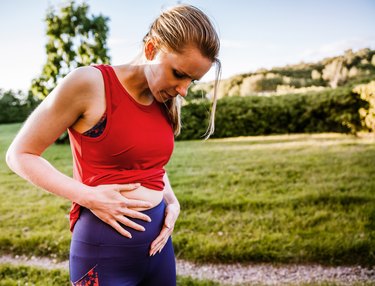
Ovarian cysts commonly affect people with ovaries during their reproductive years. While most are small and go unnoticed, according to the Mayo Clinic, others may cause a range of symptoms — from mild discomfort to severe pain.
If you have painful ovarian cysts, sometimes exercise or strenuous physical activity can add to your discomfort. However, exercise has many health benefits, including managing the abnormal hormone levels found in polycystic ovary syndrome (PCOS), a condition which is characterized by the presence of many small ovarian cysts.
Video of the Day
Video of the Day
The best way to determine if your workout is safe while you have a cyst is to know how large the cyst is and to keep tabs on your symptoms, according to Christine Greves, MD, ob-gyn at Winnie Palmer Hospital in Orlando, Florida.
"If you have no pain and the cyst is less than 3 centimeters, usually there are no concerns," she says.
Here's a deeper look at what to consider before working out with cysts.
What Are Ovarian Cysts?
Ovarian cysts are fluid-filled sacs found on or inside an ovary. These cysts are categorized as either functional, meaning they're formed during the monthly menstrual cycle, or pathological, which can be benign or cancerous growths, according to the U.S. Department of Health & Human Services.
Functional cysts are the most common, and most are harmless and don't cause symptoms.
Larger cysts may cause discomfort (such as pressure or bloating) and pain. They're also more likely to rupture (break open) and have a higher risk of ovarian torsion, a painful twisting of the ovary.
If you have large or painful cysts, your doctor will decide whether to watch and wait, prescribe medications or surgically remove them.
Exercise and Ovarian Cysts
If you have small and painless ovarian cysts (a hallmark of PCOS), it's a good idea to exercise on a regular basis. Exercise is helpful in managing PCOS, and while more research needs to be done on cysts and working out, a small study in the June 2008 issue of the Journal of Exercise Science and Physiotherapy showed that physical activity reduced cyst size in people with PCOS.
If you have large or painful cysts, though, you may want to limit or adjust the exercise you do if it adds to your discomfort. Indeed, vigorous activity may cause ovarian torsion in these cases, so you might want to avoid things like running or HIIT until the cyst gets smaller or goes away, per Nationwide Children's.
It is also possible for a cyst to rupture, or break open, during strenuous exercise, according to Johns Hopkins Medicine, and functional cysts are the most likely to rupture.
However, most of the time a ruptured cyst doesn't cause any symptoms or causes only mild symptoms, such as short-term pain that can be managed with over-the-counter pain relievers.
That's likely why a review of the management of adnexal or ovarian masses, published in the April 2016 issue of American Family Physician, does not include exercise restriction in ovarian cyst management.
Sometimes a ruptured cyst can lead to more serious symptoms, such as severe pain in the lower belly and internal bleeding, which require medical treatment. If you have certain health conditions, including those that make you bleed easily, you may be at higher risk for severe symptoms from a ruptured cyst.
That's why it's most important to follow the advice of your doctor when it comes to exercising with ovarian cysts, as they will be able to assess your risk based on the type and size of cyst you have as well as your health status and medical history.
When to See a Doctor
Consult your doctor if you think you have an ovarian cyst, as only a doctor can accurately diagnose you.
If you know you have a cyst, talk to your doctor about what level of exercise is safe for you.
Finally, get medical help immediately if you have severe symptoms of a ruptured cyst, such as sudden, severe and sharp pain in the lower abdomen which may be accompanied by nausea and vomiting.
FAQ
Common Questions
Could pain in your lower abdomen during exercise be an ovarian cyst?
"Yes," Dr. Greves says. "However, it could also be gas, adhesions, a cramp from your workout or something else."
The only way to know if you have a cyst is to have a doctor diagnose you.
Does exercise aggravate ovarian cysts?
If the cyst is on the larger size, vigorous activity can irritate it, according to Dr. Greves. However, small cysts shouldn't be bothered by regular exercise.
Are there things that should be avoided with ovarian cysts?
"If you have a large ovarian cyst, avoid extreme physical activity," Dr. Greves says. "Also avoid not listening to your body. If you have onset of significant pain, get medical attention."
Is there anything that naturally shrinks ovarian cysts?
"Time," Dr. Greves says. Most functional ovarian cysts often go away on their own.
Dr. Greves also suggests focusing on managing your symptoms. "Try a heating pad if the pain is not so significant that it brings you to the emergency department," she says.
- Office on Women's Health: Ovarian Cysts
- Minerva Endocrinologica: Overweight in polycystic ovary syndrome. An Update on Evidence Based Advice on Diet, Exercise and Metformin Use for Weight Loss
- Human Reproduction: Exercise‐Induced Ovarian Torsion in the Cycle Following Gonadotrophin Therapy: Case Report
- Ovarian Cysts: Mayo Clinic
- Johns Hopkins Medicine: "Management of Ruptured Ovarian Cyst"
- Nationwide Children's: "Ovarian Cyst and Torsion: Symptoms, Diagnosis and Treatment"
Is this an emergency? If you are experiencing serious medical symptoms, please see the National Library of Medicine’s list of signs you need emergency medical attention or call 911.